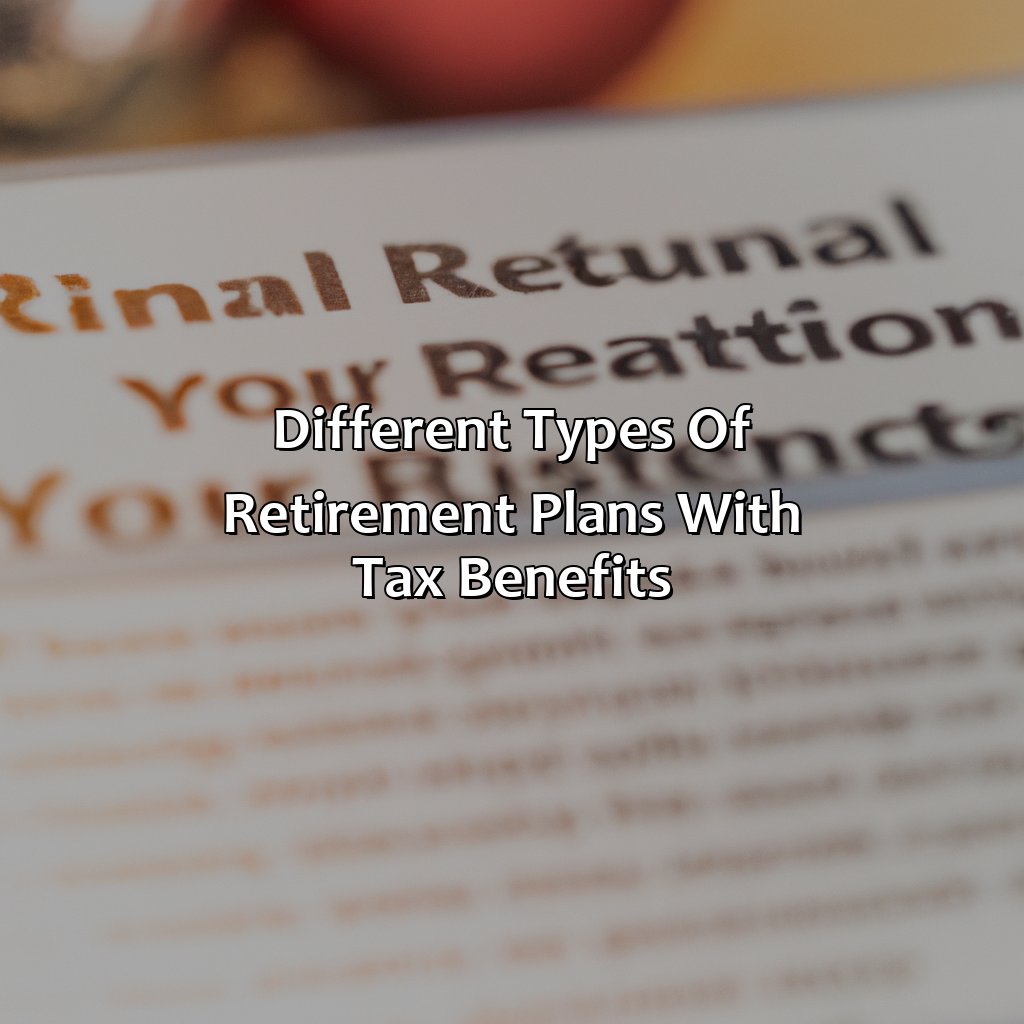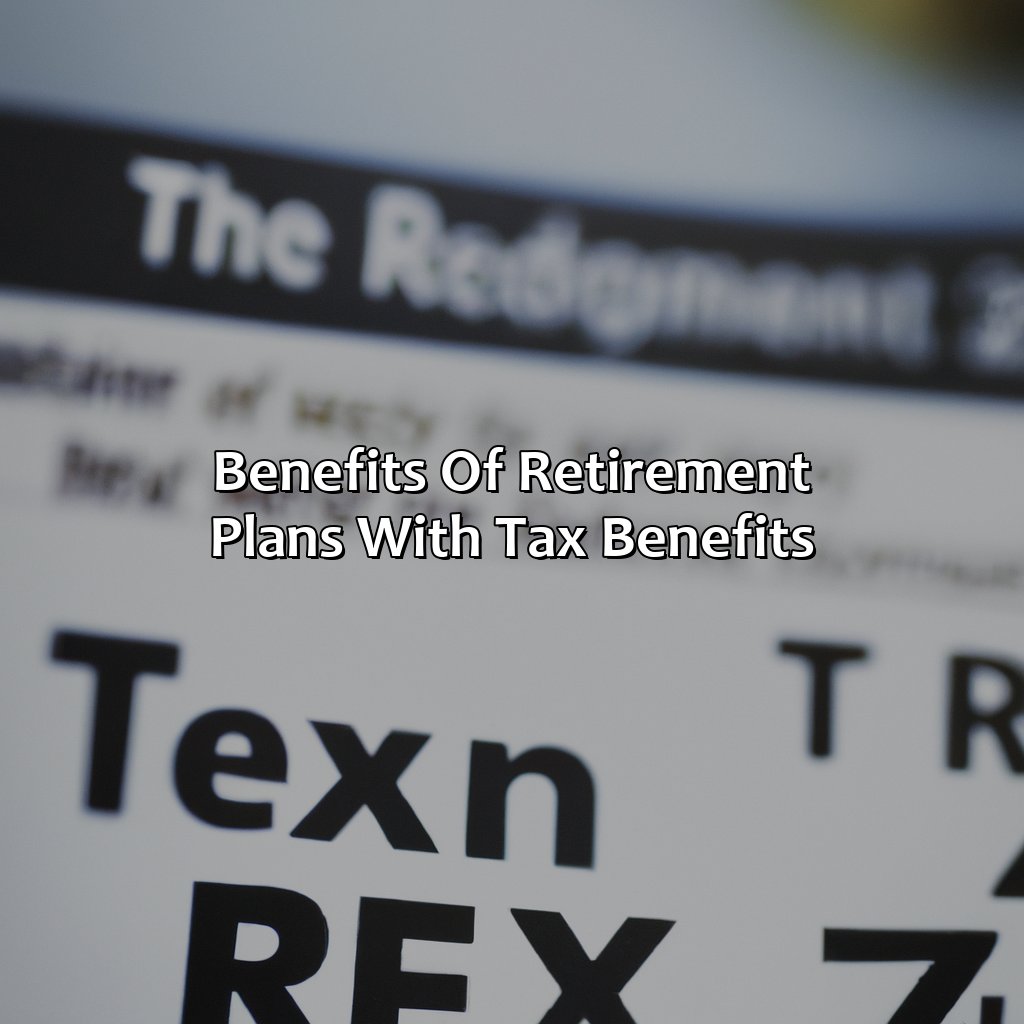What Retirement Plan Offers Tax Benefits?
Key Takeaway:
- Retirement plans with tax benefits offer advantages such as tax deductions, tax-free withdrawals, and tax credits. These benefits can help you save money on taxes and increase your retirement savings.
- Types of retirement plans with tax benefits include traditional IRA, Roth IRA, 401(k) plan, and Simplified Employee Pension (SEP) plan. Each plan has its own eligibility criteria, contribution limits, and tax benefits, so it’s important to choose the right plan for your needs.
- When selecting a retirement plan with tax benefits, consider your income level, retirement goals, and tax bracket. Consulting with a financial advisor can also help you make informed decisions about your retirement savings.
Do you want to maximize your retirement savings and take advantage of tax benefits? This blog will guide you through the best retirement plans that can help you maximize your retirement savings and reduce the tax burden. You’ll learn about the benefits of various plans and which is the best plan for you.
Different Types of Retirement Plans with Tax Benefits
Investing in Retirement Plans with Tax Benefits
Retirement planning can help you to secure your financial future. A crucial aspect of retirement planning is selecting the right retirement plan with tax benefits. Investing in retirement plans not only helps in saving for retirement, but it also offers valuable tax incentives that can help you to enjoy a stress-free retirement life.
Different Retirement Plans with Tax Benefits
There are several retirement plans that offer tax benefits. Below are some of the most popular options:
- Traditional IRA
- Roth IRA
- 401(k) Plan
- 403(b) Plan
- SEP IRA
- SIMPLE IRA
Each of these plans has unique features, specifications, and tax benefits. Understanding the differences between them can enable you to identify the best retirement plan suitable for your retirement savings goals.
Unique Details to Consider
When selecting a retirement plan, it is crucial to consider several factors, including your age, retirement goals, risk tolerance, and financial situation. Moreover, some plans offer better tax benefits than others, depending on your income, filing status, and other relevant factors. Hence, it is advisable to consult a financial planner or tax advisor to help you select the most suitable retirement plan with tax benefits.
Suggestions for Retirement Planning
Apart from investing in tax-advantaged retirement plans, there are other strategies to maximize your retirement savings. For instance, you can consider contributing to a Health Savings Account (HSA) if you have a high-deductible health insurance plan. Additionally, you can explore ways to reduce your expenses and increase your savings rate. These strategies can help you to increase your retirement savings as well as reduce your tax liabilities in retirement.

Image credits: retiregenz.com by Joel Jones
Benefits of Retirement Plans with Tax Benefits
Retirement Plans with Tax Benefits are a great way to ensure a secure financial future. Here are some Benefits of Retirement Plans with Tax Benefits:
- Reduction of Tax Liability
- Tax-Free Growth
- Pre-tax Contributions
- Employer Contributions
- Withdrawals at a Lower Tax Bracket
Investing in retirement plans with tax benefits could also lead to lower tax payments in the future. Although, it is essential to keep track of the withdrawals and contributions to avoid any tax-related surprises.
Retirement planning is vital to cover expenses in retirement. Individuals should start investing as early as possible and aim to invest at least 15% of their pre-tax income. A little effort and planning now can provide substantial financial rewards in retirement.

Image credits: retiregenz.com by David Duncun
Eligibility and Contribution Limits of Retirement Plans with Tax Benefits
Retirement plans that offer tax benefits are a good way to plan for your future. These plans have eligibility criteria and contribution limits. Here are details about some popular retirement plans:
| Plan Name | Eligibility | Contribution Limits |
|---|---|---|
| 401(k) | Employees of companies that offer a 401(k) plan | Up to $19,500 per year |
| IRA | Anyone with earned income | Up to $6,000 per year |
| Roth IRA | Anyone with earned income and income restrictions | Up to $6,000 per year |
| SEP IRA | Self-employed individuals or small business owners | Up to 25% of income or $58,000, whichever is less |
It’s important to note that contribution limits may change each year, so it’s crucial to keep up-to-date with the latest information. Additionally, some plans may have different eligibility requirements based on factors such as age or years of service.
When it comes to planning for your retirement, it’s better to start sooner rather than later. Don’t miss out on the opportunity to save for your future and have a comfortable retirement. Take advantage of retirement plans with tax benefits and start saving today.

Image credits: retiregenz.com by Yuval Woodhock
Five Facts About Retirement Plans With Tax Benefits:
- ✅ Retirement plans, such as 401(k), IRA, and Roth IRA offer tax benefits. (Source: NerdWallet)
- ✅ Contributions to traditional 401(k) and IRA plans are tax-deductible. (Source: Investopedia)
- ✅ Roth IRA contributions are made with after-tax dollars, but withdrawals during retirement are tax-free. (Source: Forbes)
- ✅ Employer matching contributions to retirement plans also offer tax benefits. (Source: The Balance)
- ✅ Retirement plans allow for tax-free growth of investments, resulting in greater long-term gains. (Source: CNBC)
FAQs about What Retirement Plan Offers Tax Benefits?
What retirement plan offers tax benefits?
There are several retirement plans that offer tax benefits, including:
- Traditional IRA
- Roth IRA
- 401(k)
- 403(b)
- 457(b)
- SIMPLE IRA
What are the tax benefits of a traditional IRA?
Contributions made to a traditional IRA are tax-deductible in the year they are made. The money in the account grows tax-deferred, meaning you don’t pay taxes on any gains until you withdraw the money during retirement.
What are the tax benefits of a Roth IRA?
Contributions made to a Roth IRA are not tax-deductible, but the money in the account grows tax-free. This means you won’t have to pay any taxes on the gains when you withdraw the money during retirement.
What are the tax benefits of a 401(k) plan?
Contributions made to a 401(k) plan are tax-deductible, and the money in the account grows tax-deferred. You don’t have to pay taxes on any gains until you withdraw the money during retirement.
What are the tax benefits of a 403(b) plan?
Contributions made to a 403(b) plan are tax-deductible, and the money in the account grows tax-deferred. You don’t have to pay taxes on any gains until you withdraw the money during retirement.
What are the tax benefits of a 457(b) plan?
Contributions made to a 457(b) plan are tax-deferred, and the money in the account grows tax-deferred. You don’t have to pay taxes on any gains until you withdraw the money during retirement.






